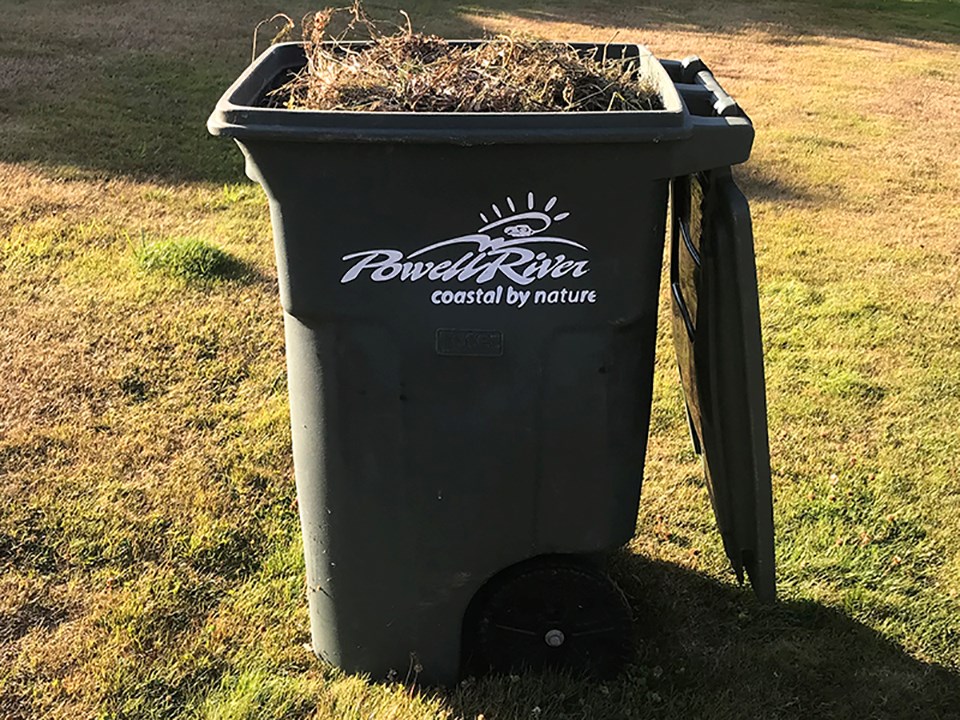City of Powell River will initiate residential organics collection for all houses prior to March 31, 2024. The city will also initiate biweekly collecting of residential garbage and recyclables prior to May 31, 2024.
At the December 7 council meeting, councillor Trina Isakson said her many reasons for support include the fact that there is a slight increase in costs to collect organic materials, but over time, if and when there is a local solution for processing compostable materials, those costs drop.
“It [establishing the program] allows us to retain a grant of more than $200,000, which we would have to give up if we did not implement organic recycling city-wide,” said Isakson. “Also, I know many residents are interested in decreasing their garbage. They love recycling and many people want to reduce their garbage further and therefore reduce our greenhouse gas emissions by processing organics and making it into compost rather than shipping it all the way to Washington State."
“About 40 per cent of our waste is compostable, and by expanding compost city-wide, we can take care of that garbage problem locally rather than shipping it to Washington State.”
According to a staff report, the city is eligible to receive $213,218 in a grant to reimburse the cost of the organics carts for the city’s more than 5,800 households. The staff report indicated that the region’s organics collected in the city’s pilot program are shipped to a facility in Sechelt, with an anticipated $70,000 in transportation costs. The report stated that a local processing facility would remove the transportation piece, resulting in lower costs and less greenhouse gas emissions.
Councillor Cindy Elliott said tipping fees for organics are lower than the fees for garbage. She said if 40 per cent of garbage is diverted to Sechelt rather than Washington State, that’s a savings. She asked why there was an increase in costs if the city is taking out 40 per cent of the garbage and paying less for it.
“It turns out that doing city-wide organics requires more trucks to collect the organics,” said Elliott. “What I learned is we need to go out weekly and have regular garbage pickup at least biweekly. Once we have organics processing locally, we will drop back down to saving on greenhouse gas emissions, and we will be producing soils for food security and lowering our costs overall. It’s a step to reducing the amount of stuff we put in the ground and our impact on the planet.”
Councillor Jim Palm said the organics carts are the same size as municipal garbage bins, which is fairly small if residents want to put yard waste into the bins, along with kitchen waste. He said when he travels to the Lower Mainland, he sees big bins for organics and people can fit their yard waste in the bins.
Opposing view
Palm added that the city is a long way from finalizing what it is doing. He said he had asked for a delay at the December 5 committee of the whole meeting so the city could get the composting program right. Because there is no composting facility in the region, he wonders how long the expense of shipping to Sechelt will go on.
“We were looking at a facility at Duck Lake but that facility fell through for whatever reason,” said Palm. “Right now, we have no location that the regional district is looking at.”
He said he could not support the recommendation.
Councillor George Doubt said the city currently collects a small amount of compost in a pilot project that it turns over to qathet Regional District, which has the responsibility for solid waste management. The regional district, after charging the city a tipping fee, takes it down to the lower Sunshine Coast, where it goes to a processing facility.
“The fact is in the composting business, the more stuff you have, the better it works,” said Doubt. “They have plenty of ability to take the city’s organics.
“If the city collects organics throughout the entire city, it will reduce the amount of garbage, for which the city pays a tipping fee, which is significantly higher than the tipping fee for compost. The benefits of having the composting done in Sechelt or locally, we reduce the amount of greenhouse gases, we reduce the expense for solid waste, we clean up the environment, and hopefully, the regional district will get to the end of the process to find a local facility.”
Councillor Earl Almeida said in the long term, it will hopefully push the regional district to come up with a solution, and when it happens, the city will be able to cut tipping fees and transportation costs.
Council voted in favour of the organics program and changes to the garbage and recycling collection, with Palm opposed.
Join the Peak's email list for the top headlines right in your inbox Monday to Friday.



